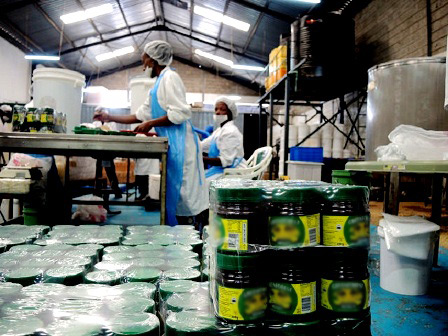By: June Gathoni
The recent Global Entrepreneurship Summit (GES2015) in Kenya did not bring business to a standstill, as word on the street characterised it. It was like the sea, seemingly calm on the surface but the undercurrents continue to stir, keeping the sea silently alive underneath. While all focus was on the summit, Kenyan entrepreneurs were already itching to set their sails. My fellow optimists will tell you that soon there will be evidence of that awakening demonstrated by a surge in new businesses and growth in the existing ones.
Among the sectors identified during the summit as viable opportunities for entrepreneurs to venture in to was manufacturing, which has for the longest time been dominated by a very small percentage of large scale investors due to the high cost of acquiring machines, lack of financing in specialized machinery and lack of technical expertise.
However, this is slowly changing with the opening of new markets offering affordable, easy to use machines, coupled with the maturing of the financial sector’s asset financing model to include other assets apart from motor vehicles.
There has never been a better time for entrepreneurs to consider manufacturing especially in this era of ‘Buy Kenya, Build Kenya’. I see this being affirmed by the commitment we are starting to notice from the government and government agencies in supporting locally produced goods.
In his address on this year’s Madaraka Day, President Uhuru Kenyatta issued a directive that 40 percent of all goods and services procured by the government must be 100 percent locally produced. To affirm that declaration, all products for the Last Mile Connectivity Project being driven by the Rural Electrification Authority and Kenya Power, and supported by the government, are supplied by locals.
Looking at the Kenya Top 100 SME Awards, companies in the sector dominate the top slots, confirming the potential it holds. This could be the next gravy train to millionaires and billionaires in Kenya.
With the recent entry in to the Kenyan retail market by two of the world’s largest retail chains- Carrefour and Game (a subsidiary of Walmart), plus our own local large and small scale supermarkets, the demand for manufactured goods has never been higher. Local manufactures can play an important role in this space, ensuring these supermarkets stock as many local products as is possible.
Then there is the devolution phenomenon. The counties are gradually becoming economic sub-hubs, creating myriad business opportunities and supporting local enterprise. It should not come as a surprise if you soon see tissue paper, for example, produced and packaged in Nyamira retailing at a kiosk or supermarket near you.
Add to this the opening up of the East African Community market. With Kenya already the economic hub of the region, the opportunity to produce for the regional market portends an unprecedented trade windfall for Kenyan entrepreneurs.
To ensure local enterprise are competitive and thriving, Parliament last August passed the Special Economic Zones (SEZs) Bill that seeks to provide an enabling environment for economic and business activities in areas designated as special economic zones and removal of impediments to economic or business activities that generate profit for enterprises.
The Bill also proposes numerous tax incentives for entrepreneurs, such as exemption from all existing taxes and duties payable under the Customs and Excise Act, Income Tax Act, East African Community Customs Management Act and Value Added Tax Act on all special economic zone transactions. In addition, these enterprises will enjoy other exemptions such as stamp duty, advertisement and license fees levied by respective county governments, among others.
These developments make it more possible than ever before for even start-up entrepreneurs to establish manufacturing businesses and for the established ones to diversify or expand their operations.
Interested in getting into manufacturing?
As I earlier stated, the manufacturing sector is no longer a preserve of the ‘big boys’. The landscape has greatly changed making it easy for more Kenyans to invest in it. Have you always wanted to start or expand your own business but were not sure how or where to begin? You now have the answer. At the SME Resource Centre, one of our programmes, Miliki Biashara, offers easy to use, affordable manufacturing equipment that will give you incredible profit margins at low operating costs.
You can acquire any of the equipment to diversify your existing business or start a new manufacturing business for products such as tissue paper, serviettes, steel wool, Ketchup, juices, egg trays, steel wire, chalk, slaughter lines and many more.
Besides providing the machines, we also offer support with insurance, technical training, entrepreneurship and business management training, packaging and standardization, and provide market linkages.
See our brochure or log on to www.smeafrica.net/miliki-biashara
About the author: June is the Director of SME Resource Centre. The centre is involved in entrepreneurship development and promotion.

